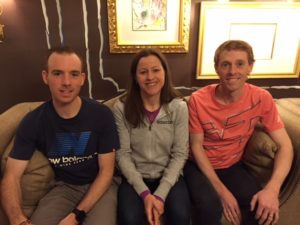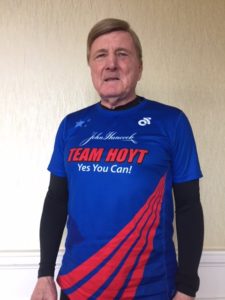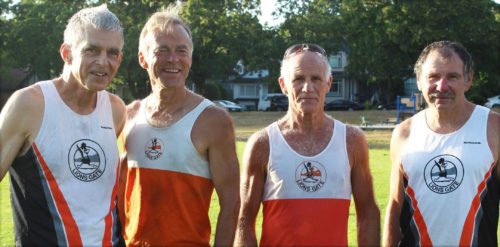Huddled at their hotel three days out from Boston Marathon race day, Canadian race royalty Krista DuChene, Eric Gillis and Reid Coolsaet, Olympians, are cool and collected. Far from unapproachable, they ask me about my race, are generous with their time, seem happy. What can we learn about racing from three legends who’ve arguably done more for the sport of marathon running in Canada than anyone else for the longest time, at least in recent memory? Krista and Reid, respectively, have the second fastest male and female marathon times in Canadian history; Gillis ran the Olympics three times, finishing tenth in 2016—the best Canadian finish since 1976.
They’re all parents. They all live in Canada. DuChene is a nutritionist; Gillis and Coolsaet, racing his first marathon in 16 months, both coach. The thought of any of the three of them involved in a doping scandal is absurd. It’s their sportsmanship, on top of their accomplishments, that make them true stars. Here’s what they had to say about Boston, about competition, about hydration, doping; about marathon running, experience, and about a life spent in and out of their racing shoes.
iRun: How big is the Boston Marathon?
Reid: It’s a big deal for a lot of people. I mean, the Olympics are a big deal for 150 people but this is exciting for everyone. Also, Boston’s not a paced race. If some athlete wants to go out hard, it might be a fast pace. Or if the weather’s crappy, we might hold back. You don’t know what’s going to happen.
Krista: Doing Boston is something I’m glad I’ve done and every marathoner wants to check off their list. There’s nothing like it, the amount of people who cheer from beginning to end, there’s nothing like it.
iRun: Can you hear the crowd?
Krista: You hear it, but when you’re running for so long you can’t let it excite you too early.
Reid: You use the energy of the crowds. That’s what’s nice about racing in front of a home crowd, you hear your name more, but if the crowds are big enough, like at the Olympics, the energy and overall people yelling will spur you on and give you energy, but you have to bottle and channel the energy.
racing in front of a home crowd, you hear your name more, but if the crowds are big enough, like at the Olympics, the energy and overall people yelling will spur you on and give you energy, but you have to bottle and channel the energy.
iRun: Are you training as much now as in the past?
Gillis: I wouldn’t say I’m training as much, no.
iRun: Could that be an advantage, a little rest on your joints and knees?
Gillis: I’m healthy. I’ve never got this far in the marathon build up to Boston. I’ve never been here before. I got my training in and I’m healthy, but I’d say maybe less recovery—not as many naps.
Reid: Is this your third time on the start list?
Gillis: Yeah, 2013 and last year.
iRun: So is it true that it’s your destiny since third time’s a charm to win the whole thing Monday?
Reid: Third time’s a charm. . .
iRun: How do you deal with the nerves?
Reid: Every time you race you’re going to feel them, once you know it’s inevitable, you don’t worry about it. It’s one part of racing that’s going to happen. You have to use that nervousness and channel it into energy.
Gillis: You have to set it before you come here. You have to have the attitude before you come, you can’t fix it here. Don’t get on the plane unless you’re mentally there.
Krista: I think it’s more significant back at home than here. Here, you get here and we’re those three Canadians, at home everyone knows you where as here, it’s just. . . different.
iRun: How detailed is your race plan for the Boston Marathon?
Reid: Mine’s not set at all. There’s no pacers here so you don’t really know what the pack is going to do. I would love to run with the front pack but if the front pack goes out at a really fast pace, I’m not going to do that. I’m going to play it by ear and feel what’s sustainable.
Gillis: Pick it up when you see, Louie. [ed note: Louis’s the name of Reid’s son, asleep in the stroller with Marie, his wife, standing behind the crew during the interview, at least for a bit].
Krista: I have a nice big window. I can’t go under 2:30 but I want to go under 2:40. 10 minutes is pretty comfortable.
Reid: I have zero time in my head. I don’t care. Especially with head winds and rain.
Gillis: Ten minutes is pretty much no time.
Reid: Right, if I said between 2:10 and 2:20. . .
iRun: Is that freeing?
Reid: It’s nice. It’s a change from city marathons where we’ve looked at the Canadian record or to qualify for the Olympics and every workout is about pace to hit goals, whereas this is more free flowing and that free feel right up to the race is freeing from the pressure to hit your splits.
Krista: That’s what appealed to me. Not having to be a slave to my watch for Standards and proving fitness and with the way the course is with the hills, it wasn’t a speed focus, but more being able to handle the hills at the end.
iRun: A lot of attention is on the stacked women’s field, including Shalane Flanagan. Is she the competition?
Krista: Oh God no. I’m hoping to be top two masters, well hey, Deena Kastor.
Gillis: 2:19?
Krista: And well, for Deena, I mean—when you’re this age what does your PB even mean anymore?
Gillis: When do you turn Masters?
Krista: 40 on race day.
Gillis: Two years for me. . . Oh my God I’m old!
Krista: I don’t even know of any others so for me to say second might be a joke. You do your best, but I would never start with Shalane and Des, they’re way beyond me.
iRun: Do they know you?
Krista: Oh yeah, you sort of do the awkward head nod, but I don’t sit and talk with them at length. There’s more on the line for them so they sort of keep on their own. It’s a pretty big deal, especially for the four of them that are going for it.
Reid: I’m not really thinking I’m going to win this race, but I also don’t want to be intimidated by 25 guys, because I’d like to beat most of them. I’ll look at their stats but come race day a lot of stuff can happen.
iRun: How interested are you in the history of the Boston Marathon?
Reid: It’s cool for sure. You see Bill Rodgers walking around, Greg Meyer, Meb. A bunch of American guys who’ve won, Amby Burfoot is here. It’s cool to read about their stories, what it was like back then: flat Coke or nothing.
Krista: Cotton socks, cardboard shoes. . .
iRun: Reid and Eric, you guys trained for years and now are apart, with Eric coaching at St. Francis—I feel like you guys are like the kids in Superbad. Do you miss each other?
Eric: Yeah.
Reid: We did a workout together and it was our first time running since the National Cross Country Championships, our first workout. From 2002 – 2017, we had a lot of chunks of time where for a month we might run half those days together.
iRun: Sucks losing your running partner.
Krista: They’re dads now.
Reid: Eric and I trained together for 15 years and our PBS are within a second-a-kilometre splits and you don’t get that too often in North America. There’s not a ton of guys running 2:12, and to have two guys on the same level and same path and have the same goal, it’s rare and it’s been great. Today we did 4 x 2 minutes, which was a reminder of what it’s like—stride for stride.
iRun: You still neck and neck?
Reid: Yeah.
Gillis: Those things don’t change unless one of us stops training. We could do a full marathon build together and not have the same race plan, you race the marathon, not each other.
Reid: Eric is more efficient than I am. Look at the 5K and 10K, I’ve beaten Eric more than he beat me, but in the marathon, we’re more evenly matched. My strengths of speed and power even out because my stride isn’t as efficient. Watch him run and it doesn’t look like he’s using as much energy as I am, but listen to our breathing, it seems like he’s working harder. It all works out in the marathon. But heat and stomach, he’s way ahead.
Krista: You have the smaller bladder, right? I’ve heard that.
Gillis: I can’t drive to the airport in Halifax without stopping.
Krista: I couldn’t go that long either.
Reid: I can go four hours, easy.
Gillis: Wow.

iRun: Drug testing and Salazar are all over the news this race, with two of his athletes racing on Monday. What’s doping mean to you?
Reid: As runners, we talk about it all the time in warm up and cool down, the stuff you read on LetsRun. But as far as having someone offer it, never. I think if you wanted to cheat, you’d have to seek it out. It’s never in your face. How I deal with it, I read about it, but when I go into competition, I can’t think about it. That gives them a one-up on you. I put it out of my head when I toe the line.
iRun: Were you ever tempted? You’re so close to breaking Drayton’s record for so long. . .
Reid: The risk and reward is just not there. I have done everything clean and can look back on my career and be happy, there’s a million reasons why I wouldn’t cheat but one is it would ruin my whole reputation.
Gillis: He’d ruin my reputation. That’s mostly why.
Krista: I wouldn’t know how to.
iRun: Whats the pre-race routine before the Boston Marathon?
Gillis: It is pretty chilled. Watch a show, relax. I know I have lots of work the next day.
Reid: I eat a lot of carbs, rice, potatoes, pasta, whatever’s available. I’m not that picky.
Gillis: What time’s the race?
iRun: Wow, you are super chilled.
Krista: There’s no secrets. We’re eating carbs, hydrating, resting, going to the washroom, and that’s about it.
Reid: It’s easier for us because getting to the start line we just get on a bus and we’re corralled. We don’t have to think about anything, it’s dummy-proof.
Gillis: The biggest thing is if it’s wet or snowing, ball cap or hat.
Krista: You don’t want rain on your face.
Reid: Relax your face a bit more.
iRun: You’re all going to wear hats if it rains?
Reid: I’ll probably end up chucking it halfway through, but I’ll wear it.
Krista: Is there a headwind?
Reid: Apparently its 20 miles an hour, 33K an hour.
Krista: That’s enough. Anything over 30 I think is significant.
iRun: Do you guys feel since you’re no longer young pups that this race is extra significant? Do you wonder how many more times realistically you can suit up to compete?
Reid: That’s one of the reasons I’m doing Boston now. I’ve put it off to run a fast course, but I want to run Boston while I’m still competitive. I thought about that, and I’m running it now, but I won’t think about that on race day.
Gillis: Same with me.
Krista: I’ve been here before and it’s neat to come back as an elite, that’s pretty cool. Also: the prize purse is decent for masters, so there’s that to consider. But even that’s a tough one. Even though you turn 40, it’s still as much work. This cycle I took one full rest day per week and I’ve never felt as good. That’s really helped.
Reid: For a lot of people getting used to the marathon, getting used to how relaxed you have to be in the beginning, getting used to fuelling. There’s a learning curve in the marathon. The Kenyans have a good approach.
iRun: How is it to be the Canadian elite squad?
Reid: People from Canada would like to see us do well. When they look at results, they can see that there’s Canadians in the top whatever. It’s something to talk about, and they can relate to it a little more. Like, that person ran the Chilly Half. That person ran in Kingston. People message me, “Go, Canada!”
Krista: It’s nice to represent our country. That always feels good.
iRun: Do the three of you feel a comradery, a certain shared world and race view?
Krista: We’re grounded. We’ve got kids. Not to say that other people aren’t in the same boat as us.
Reid: I barely just joined the club, I was an outcast to the two of them.
Krista: You now joined the club, you’re one of the “mature” racers.
Reid: We saw CPT [Charles Philibert-Thiboutot] in the lobby and Nicole Sifuentes, for sure, instant conversation. The Canadians, anywhere you go, there’s a connection right away. There’s a lot of people racing in Canada, but there’s not a lot of elites doing it internationally. You find each other pretty quickly.
Gillis: We grew up in a small town. You’ve got to be nice.
iRun: Last words for your fans before Monday’s race, and good luck and thanks for your time.
Reid: When I did the Chilly Half, usually after a half I feel a little beat up, but after that, I didn’t feel beat up at all. Going into a marathon, you don’t want any aches and pains. I’m feeling good.
Gillis: I ran the course 13 months ago, I’m feeling pretty solid.
Krista: It’s going to be a great day no matter what happens. We’re happy to be here, happy to be racing and I hope this is the same for everyone: we’re having fun.






 racing in front of a home crowd, you hear your name more, but if the crowds are big enough, like at the Olympics, the energy and overall people yelling will spur you on and give you energy, but you have to bottle and channel the energy.
racing in front of a home crowd, you hear your name more, but if the crowds are big enough, like at the Olympics, the energy and overall people yelling will spur you on and give you energy, but you have to bottle and channel the energy.






 Our Magazine
Our Magazine Previous Release
Previous Release
